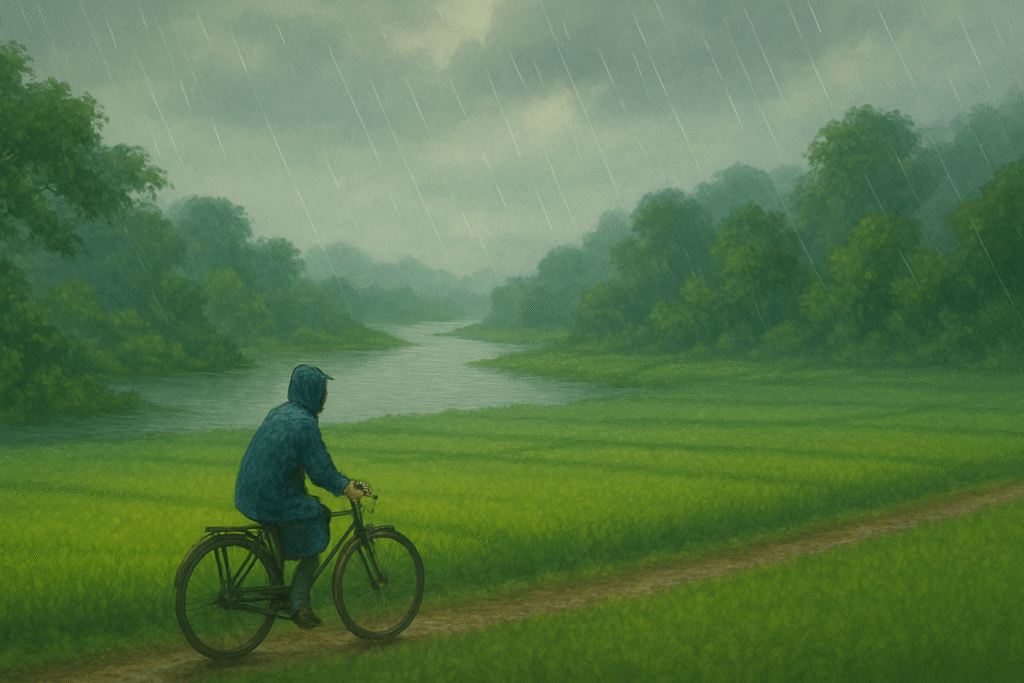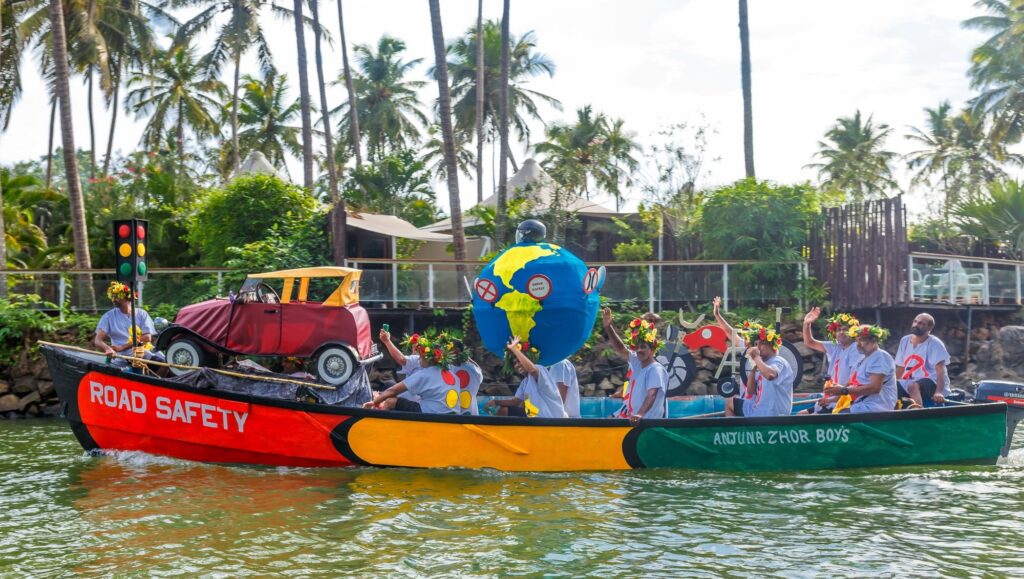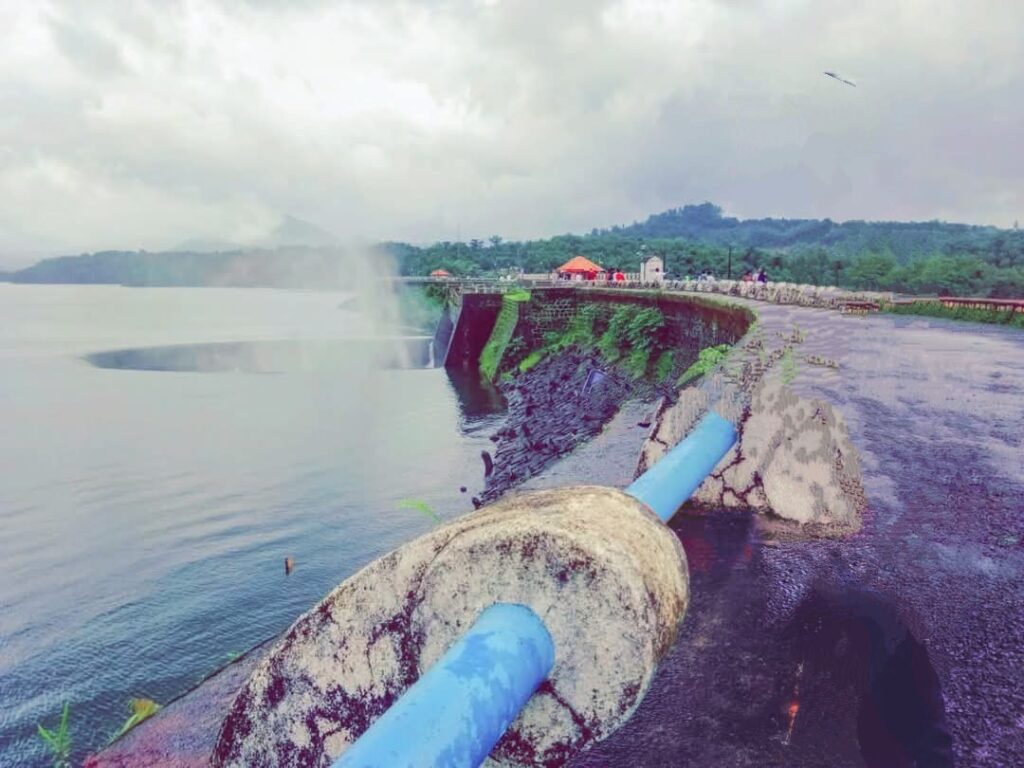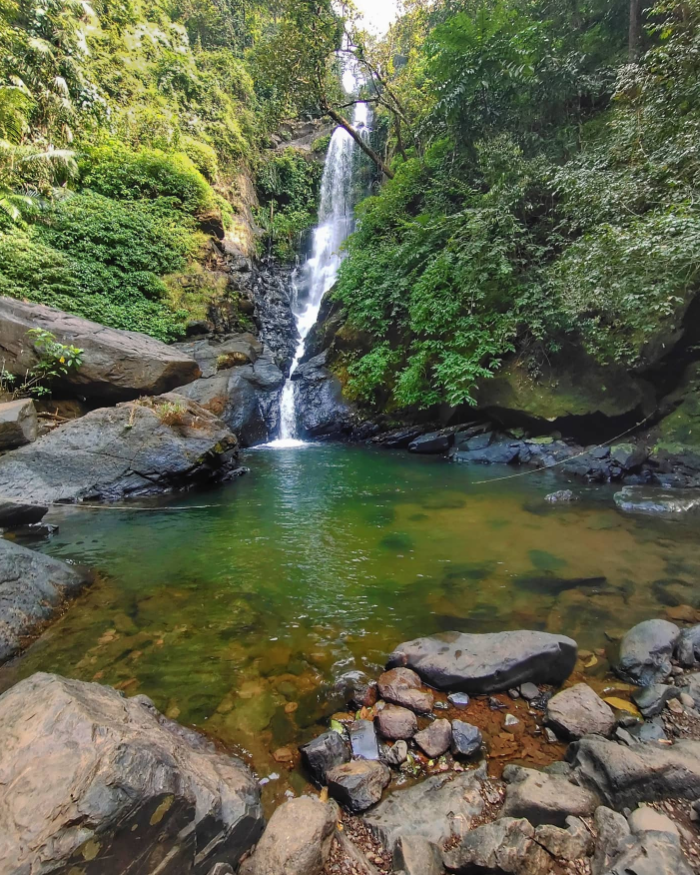
As the first monsoon rain hits Palolem, the air turns sweet with the scent of wet Goan soil and forest. The sea grows wild, the beaches empty, and my hometown palolem which is as south goa heaven transforms into a quieter, greener version of itself. Growing up here, I’ve spent many rainy seasons and days cycling through paddy fields,catching catfish fish and golden apple snails(CONGE in Konkani), sipping tea and onion pakodas, and listening to the rhythm of rain on tiled roofs.
This isn’t the Goa of crowded winters—it’s a secret season for those who love slow, soulful travel. In this Goa monsoon travel guide, I share my favourite experiences, stays, and tips to make your rainy season trip unforgettable.
Why Visit Goa in the Monsoon?
The monsoon in Goa from June to September, paints the state in vivid greens.Temperatures linger between 24°C and 29°C, with high humidity levels cooled by breezy showers and dramatic downpours. Unlike the busy winter months, the rainy season offers fewer crowds, affordable stays, and a chance to see Goa’s hinterlands come alive.
•Nature at its peak: Seasonal waterfalls like Dudhsagar ,Harvalem,Mainapi and Savari , while forests in Netravali and Cotigao burst with life.
•Economical travel: Monsoon rates at accommodations like Tubki Resort and Patnem Beach Park are lower than peak season.
•Slow travel vibes: With fewer tourists, you can explore villages like Divar or Chorao, soaking in the susegad (laid-back) Goan spirit with ease.
•Cultural immersion: Join locals for festivals like Sao Joao featuring well-jumping, boat processions, music,dance with fun and joy.
When Does the Monsoon Hit Goa?
Goa’s monsoon typically begins in early June with pre-monsoon showers, turning hot and humid. By late June, the rains settle in, bringing cloudy skies, cool breezes, and occasional thunderstorms. The heaviest rainfall occurs from July to August, slowing to gentler showers by September. My suggested time to visit goa is late August, when the landscape is lush, and the rains are less intense. Last year’s i.e. 2024 total rainfall of goa was 173 inches.
Tip: Always carry a raincoat or umbrella—Goa’s showers can be unpredictable!
Top Monsoon Activities in Goa
Goa’s beaches take a backseat in the rains, but the the wildlife steal the show. Here are my personal suggestion experience the monsoon in Goa:
Waterfall Hiking (No Swimming)
Goa’s waterfalls shine during the monsoon, but safety is paramount. Swimming is prohibited due to strong currents and slippery rocks, which can lead to accidents. Instead, join trusted operators like Beatroute Explorers for stunning treks to these waterfalls.
• Dudhsagar Falls: A dramatic trek along railway tracks
• Savari and Mainapi Falls: Hidden in Netravali, these are perfect for quiet, guided hikes.
• Bhupar,Bamanbudo and Pali Falls: Less crowded, with trails through bamboo groves and wild turmeric.
Safety Note: Always hike with a guide, wear sturdy shoes, and avoid slippery paths.
Cycling Along the Chapora River
Cycling through Goa’s interior roads on a cloudy day is pure joy. Cycling Zens and B:Live offer guided e-bike tours along the Chapora River, passing rice paddies and sleepy villages. Rent a bike for solo rides, but stick to paved paths to avoid muddy trails.
Birdwatching in Chorao
Join Uday Mandrekar,(Contact+919822583127) a boatman and is now known as the Birdman of Chorao, for a morning in the Salim Ali Bird Sanctuary. sail through mangrooves to Spot Malabar hornbills, kingfishers, and migratory storks . It’s a treat for nature lovers and photographers.
Kayaking in the Mangroves
Water sports experts Konkan Explorers Konkan Explorers runs composed kayaking trips on the Chapora River and backwaters. Paddle through mangrove tunnels, spotting crabs and fish, as the rain adds a magical sheen to the water.
Sao Joao Festival

In early June, villages like Siolim and Bicholim celebrate Sao Joao, where locals jump into wells to honor St. John the Baptist. Visit and join the fun, sip homemade wine, and dance to Konkani music.
Divar Island
This island is a cyclist’s dream—quiet lanes, old Portuguese houses, and no crowds. I remember biking during my collage tour here with friends one rainy afternoon, stopping to chat with a local lady who offered us hot tea. It’s pure peace.
Chorla Ghats
Drive through these misty hills for views that’ll leave you speechless. The road to the Goa-Maharashtra-Karnataka border is bumpy, but the clouds rolling over green slopes make it worth it.
Salaulim Dam
Salaulim Dam, located in South Goa, is particularly stunning during the monsoon in July. It features a unique “duckbill spillway,” where excess water flows into a circular outlet, offering breathtaking views. Situated 5 km from Sanguem town, about 61 km from Panaji, and 43 km from Palolem, this dam is on the Salaulim River, a tributary of the Zuari River. The nearby Botanical Gardens, inspired by Brindavan Gardens in Mysore, are ideal for a tranquil picnic.

Chapoli Dam
Chapoli Dam in Canacona, just 5.4 km from Palolem, is a calm spot to feel happy during the monsoon. Nestled in a valley with the Western Ghats around, it’s perfect for a quiet evening. It’s a great place to visit with kids, as it has a small garden with a few activities for children.
Netravali Wildlife Sanctuary & Tanshikar Spice Farm

This sanctuary near Netravali is a trekker’s paradise, home to Savari and Mainapi waterfalls and the quirky Netravali Bubble Lake, where bubbles pop up from the water—such a curious sight! For safety, stick to guided trails. Nearby, I explored Tanshikar Spice Farm, a family-run organic farm. The owner’s son gives a one-hour tour, showing off vanilla, cinnamon, clove, and other spices and honey production. Afterward, you can enjoy their homemade food, buy pickles, or grab in-house items. If you’re visiting all of Netravali’s attractions, their cozy rooms are perfect for an overnight stay.
Tip: if you are in palolem you will get to visit small Gavne,Bhupar & Bamanbudo waterfalls on the way to Netravali & if you are planning a overnight stay at Tanshikar Farm then visit Salaulim dam which is just 30 kms away.
PALOLEM CANACONA-TOWARDS GAONDONDRI VILLAGE-GAVNE DAM-BHUPAR-BAMONBUDO-BUBBLE LAKE-TANSHIKAR FARM-SAVARI-MAINAPI
Netravali Bubble Lake
A hidden gem in Netravali Wildlife Sanctuary, this lake is amazing with bubbles rising from the water during the rains. It feels like nature’s own magic show, and I was so curious watching it! A short trek through lush jungles gets you there.
Cotigao Wildlife Sanctuary
Dense forests, hidden streams, and wildlife sightings make this a must-visit. I once spotted a shy deer here during a monsoon hike—such a happy moment!
Mollem National Park
A biodiversity hotspot with trails to Tambdi and Dudhsagar Falls. The jungle feels alive with birds and frogs in the rains.
Fort Aguada
Start an early morning hike from this 17th-century fort for misty coastal views. It’s one of those places where you feel Goa’s history and nature come together.
Chapora Fort
Perfect for solitude and sea views, but watch your step—the paths get slippery in the rain. I love sitting here, just listening to the waves crash below.
Where to Stay in Goa During Monsoon
Beach shacks are closed and the best and most economical places to stay are apartments. If you can spend more, hotels a bit away from the beach are also good options.
As a local, I’ve never stayed in hotels, so I won’t suggest any. If you want information about where to stay in Canacona or Palolem, below are my choices, as I know Canacona road by road.
Apartments
Palolem Garden Estate, Sawantwada, 1.7 km from Palolem (with pool)
Palolem Plaza, Devabagh, 1.9 km from Palolem
Patnem Beach Park, near Patnem Beach, 3.2 km from Palolem (with pool)
Best Resorts
Sobit Sarovar Portico, 750 m from Palolem
Tubki Resort, near Patnem Beach, 3.2 km from Palolem Cloud 9, near Patnem Beach, 3.5 km from Palolem
What to Eat in the Monsoon?
The highest searched term on Google and the most common question asked to locals is about food afterall its papi pet ka sawaal friends..
Seasonal fishing is banned during the monsoon season in Goa, Maharashtra, Karnataka, and Kerala. The ban typically lasts for 61 days, from June 1st to July 31st, to protect fish breeding and reduce risks to fishermen. Due to this, we get limited fish from our local fishermen, so we make xit kodi (fish curry rice), which is our daily staple food. Other fish during the monsoon are either cold-blasted or box-packed, which aren’t tasty at all, so avoid eating them. Search on Google for the best restaurants around your location as per your cravings
In Canacona, you can try these palces:
Anandi Classic, Gulem, near the petrol pump, 4.2 km from Palolem—worth trying for Indian and local dishes.
Sai Family Dhaba, 1 km from Palolem.
Castaad Kitchen, 3.2 km from Palolem.
Cuba Pure Veg, for veg lovers.
Breakfast
Try local tea stalls and hotels like Tokko Chai Shop or Patnem Chai Shop. For dosa and idli lovers, visit Coastal Palace, Nagarcem Chawdi, or Hotel Saraswati, Upupi Char Rasta.
Items to Carry During Monsoon Visits
Monsoon in Goa means rain, so come prepared! Bring a raincoat and umbrella to stay dry, a waterproof cover for your mobile to keep it safe, and non-slip slippers to avoid slipping on wet trails. Carry a water bottle to stay hydrated and mosquito repellent spray, as treks can be tiring & full of mosquito bites. Heads up—mobile signals are often unavailable in places like Netravali and other jungle spots, so let someone know your plans before heading out.
Need Help in Palolem, Canacona? Contact D Destinations!
Planning to visit and explore Palolem, Canacona during your Goa monsoon travel? If you need help to rent a car or bike,even a cozy apartment, D Destinations is the best choice!.
Final Thoughts
Goa in the monsoon is a magical experience, especially when you explore it like a local. From misty waterfalls to quiet villages, there’s so much to discover.
Late August is the best time for Goa monsoon travel. The rains are gentler, and the landscape is super green—perfect for exploring!
Bring a raincoat, umbrella, non-slip slippers, mosquito repellant spray or cream and a waterproof cover for your phone. Don’t forget a water bottle for treks!”
Beaches can be risky due to rough seas and strong currents. Stick to activities like waterfall hiking or kayaking for a safe, happy trip.
